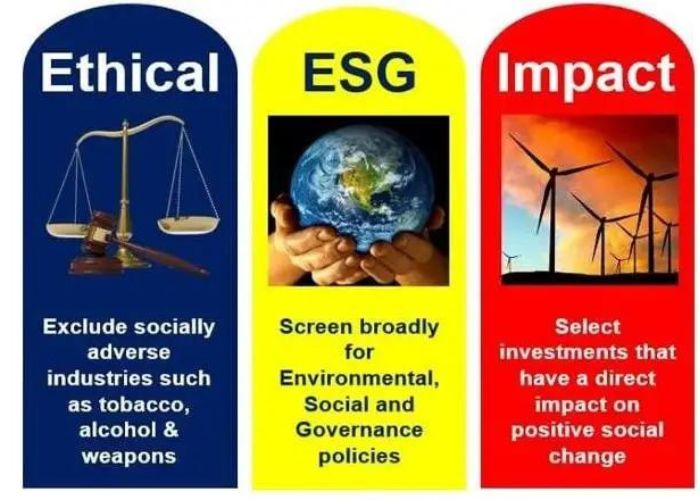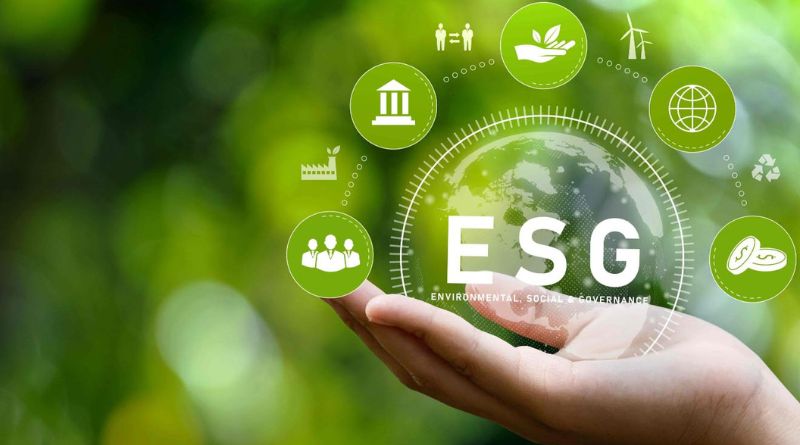ESG stands for “Environment, Society, and Governance.” These are the three most important things to look at when figuring out how fair and sustainable an investment in a business or company is. Most buyers who care about doing good for society check out companies using ESG factors.
It is a general term used in capital markets, and buyers often use it to judge how companies act and predict how well they will do financially in the future.
The Environmental, Social, and Governance factors are a subset of non-financial performance measures. They include ethical, sustainable, and corporate governance problems like making sure there are systems in place to ensure responsibility and control the corporation’s carbon footprint.
Since the beginning of this decade, the number of investment funds that take ESG factors into account has grown quickly, and this trend is likely to continue over the next ten years. The three main parts of ESG are:
Environmental factors look at how well a business takes care of the natural world, with a focus on:
Pollution and waste
resource loss
Greenhouse gas emissions from cutting down trees
climate change
Social factors look at how people are treated by the company and focus on:
employee relations and diversity; working conditions, including child labor and slavery; local communities; tries to fund projects or organizations that will help poor and underserved communities around the world; health and safety conflicts.
Governance factors look at how a company keeps itself in check, or how it is run, and they focus on:
plan for taxes
Executive remuneration
Corruption and bribes, political funding and lobbying, board variety and structureIf you are a trader and want to buy ESG-screened shares, you should look into socially responsible mutual funds and exchange-traded funds.
Experts say that what makes a good set of ESG criteria is subjective and depends on your goals. This means that you will have to do your own study if you want to find investments that match your values exactly.
Also, read : 9 Essential Accounting Tips for Small Businesses
ESG and the alternative investment world
ESG standards are becoming more and more important in the world of alternative investments. ESG problems are not only important for figuring out how long the non-financial effects of investments will last, but they may also have a big effect on how investments perform and how risky they are in the long run.
A recent study found that buyers who choose investments that are screened for their social and environmental impact get a “double dividend” in the form of lower risk and a better rate of return.
*The rate of return is the amount of money made from an investment compared to how much it cost to start.
Businesses that follow ESG standards tend to be more responsible and take less risk, which means they are more likely to reach their long-term business goals. Traditional investors are getting more and more interested in the ESG framework, and many of them have started using its standards to evaluate risk when making investment decisions.
TriLinc Global LLC, a private financial management business that focuses on launching and managing new goods, says”
“ESG guidelines add an extra level of due diligence, which is good for owners. When the UN started the UNPRI in 2006 and watchdogs like Bloomberg and MSCI started keeping track of ESG, it was clear that this was not a passing trend.
“ESG weeds out companies that aren’t sustainable because they use old methods or have harmful side effects. It also reduces risk for investors by helping them put their money into more responsible companies that are more likely to succeed in the long run.”
ESG-screened purchases are good ones.
When looking for business options, people now think about environmental, social, and governance problems a lot more than they used to. Investors who are driven by both worth and values use a variety of ways to think about ESG problems across all types of assets. It is a myth that buying with a social conscience will cost you money or make you less money. In fact, the opposite is often true.

Environmental, Social, and Governance Issues in Investing: A Guide for Investment Professionals was written by Usman Hayat, CFA, and Matt Orsagh, CFA, CIPM. It was released by the CFA Institute last year.
“However, there is still a mistaken belief that the empirical evidence shows that ESG factors hurt financial performance.”
“A key point in the discussion of ESG issues for investment professionals is that taking ESG issues into account in a systematic way is likely to lead to more complete investment analyses and better-informed investment decisions.”
In another paper published by the CFA Institute, “Integrating ESG into the Fixed-Income Portfolio,” Christoph Klein CFA says that integrating ESG criteria into fixed-income analysis can reduce individual and portfolio risk while improving performance by “helping investors anticipate and avoid investments that may be prone to credit rating downgrades, widening credit spreads, and price volatility.”
The following is what the Financial Times Lexicon says about Environmental, Social, and Governance:
“ESG” stands for “environmental, social, and governance.” It is a general term used in capital markets and by investors to judge how companies act and predict how well they will do financially in the future.
“ESG factors are a subset of non-financial performance indicators. They include things like managing the company’s carbon footprint and making sure there are systems in place to make sure people are held accountable.”
The way people think is changing.
Google and Impax asked more than 300 people with at least £500,000 ($700,000) in long-term savings and investments to fill out a poll. The goal was to find out how they felt about climate change after the COP21 meeting in Paris.
Here are some of the things the poll found:
70% of the people who answered the survey said that climate change was a worry.
15.3% of people said they had both invested in stocks of sustainable/clean energy companies and stopped dealing in fossil fuels.
33.5% said they have interests that are focused on clean energy, saving energy, or being sustainable.
Hamish Chamberlayne, an SRI manager at Henderson Global Investors, was quoted by Nyree Stewart in the Financial Times as saying:
“The big picture is that in the next few decades, the world economy will change to a low-carbon economy, which will be one of the biggest investment opportunities of our lifetimes.”
“The global economy is worth about $80trn [£56.3trn] and is very reliant on carbon. Switching to an economy that is much less reliant on carbon will have a huge effect on existing businesses, geopolitical relationships, and how the global economy works. There will be a lot of risks and chances in the next 10 to 20 years.”







